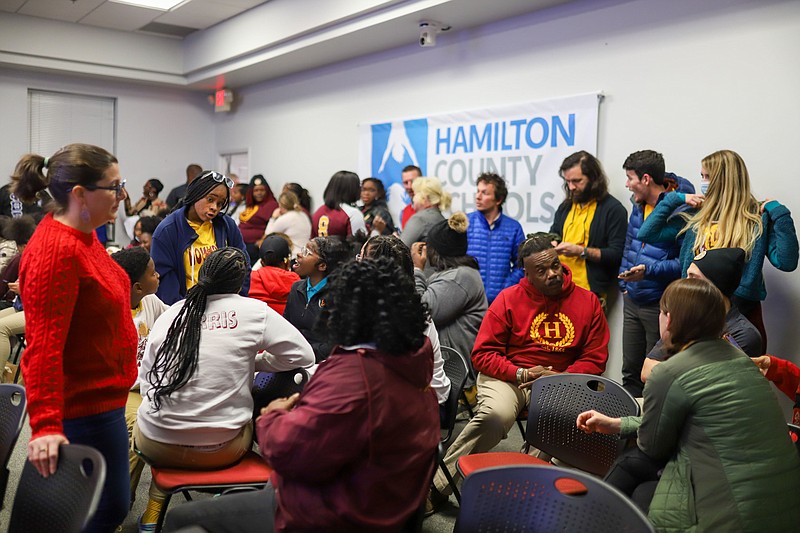A Chattanooga lawmaker has filed a bill that would keep employees at public schools and universities from being required to take "implicit bias" training.
Implicit bias training is geared toward helping prevent employees from developing attitudes or associating stereotypes about people without the employees' conscious knowledge.
Sponsor Sen. Todd Gardenhire said being required to take such training is akin to "having to admit to something that you're not." His bill defines the training as any program that presumes an individual is "unconsciously, subconsciously, or unintentionally" predisposed to "be unfairly prejudiced in favor of or against a thing, person, or group to adjust the individual's patterns of thinking in order to eliminate the individual's unconscious bias or prejudice."
The bill further states employees cannot have adverse actions taken against them for refusing to take implicit bias training.
Whether such training is offered is up to local school districts, charter schools and the state.
A inquiry to Hamilton County Schools about whether this type of training is offered by the district was not answered by press time.
Gardenhire told this page last week the idea for the bill came from a Wall Street Journal article which detailed the story of a nurse with a 39-year career in Texas who refused implicit bias training and was fired.
"The premise [of such training] is you're a racist, and you need to apologize," he said.
Gardenhire said he and state Rep. Jason Zachary, R-Knoxville, the House sponsor, have had calls about their bill from educators, saying thank you for sponsoring it. He said callers basically described their training as: "If you're white, you're racist; if you're Southern Baptist and white, you're even worse."
Zachary in a phone conversation with this page said he'd talked to multiple teachers and administration in Knox County, where the training is mandatory. He said they described sessions that were demeaning to white people, who were "appalled" at what was being said. At one session, he said, "multiple people got up and walked out."
"They weren't creating inclusion," he said. "They were creating division and exclusion. That is not acceptable."
"We have enough trouble finding teachers today ... without being [judged] guilty of racism until you can prove you're not," Gardenhire said. "[Implicit bias training] does more harm than good."
If, in fact, callers to Gardenhire and Zachary were accurate in their description of their trainings, such trainings have no place in schools.
However, we do believe there is important information teachers could learn from such training. A Yale teaching center provides some examples:
› Instructors may expect students who speak with certain accents to be poor writers.
› Students with substandard writing abilities may be stereotyped as lacking intellectual ability.
› Instructors might treat students with physical disabilities as if they may also have mental disabilities, and thus require more attention.
What teacher would not want to know, or be reminded of, such examples if the goal were to educate students and move them from where they are to a higher plain?
The problem, we see, is twofold.
First, the name of the training, yes, implies that those who take such training have biases. They may lack full understanding about people of other races and cultures but the word "bias" suggests they willfully and knowingly treat people differently.
Second, since examples like those from Yale show that such training goes beyond race, such training should make clear it is not geared toward one race over another, that one group has more to learn than another or that such training is any kind of attempt to level the playing field.
All teachers should be in the business of education, after all, not social reordering.
Our points above may be why critics have said there is little evidence implicit bias training works.
A recent report by Britain's Equality and Human Rights Commission, which examined 18 papers on unconscious bias training programs, concluded the courses are effective at raising awareness of bias, but the evidence of long-lasting behavioral change is "limited."
As to Gardenhire's bill, our first preference would be for organizations who purport to offer such training to rework their presentations, not point fingers or accuse people of something they're not. Shy of that, it should fall on district administration officials to vet any organization that offers such training to learn what is in it. If it pits races against each other or is in any way like the trainings teachers complained about to Gardenhire and Zachary, they should turn it down.
If any of the above cannot be accomplished, we would support the bill, though we hope the knowledge and understanding about people of different races and culture could be imparted in some other way.
"In America," Gardenhire said, "you're supposed to be innocent until proven guilty."
It's a shame it has to take such a bill to make that clear.
